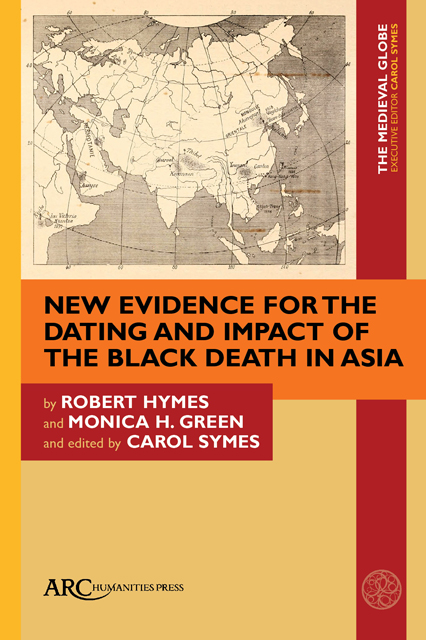Putting Asia on the Black Death Map
Published online by Cambridge University Press: 06 April 2023
Summary
THE APPEARANCE OF Robert Hymes’s essay, “Buboes in ThirteenthCentury China: Evidence from Chinese Medical Writings,” brings The Medieval Globe back to its roots eight years ago. In 2014, Hymes presented his initial thoughts on how the thenemerging evolutionary history of the plague bacterium, Yersinia pestis, might relate to massively lethal epidemics in Jinera northern China that seemed to be plaguelike in their manifestations. Could plague’s late medieval proliferation have started more than a century before the Black Death of the midfourteenth century, long known through documentation from western Asia, Europe, and North Africa? Could it have first struck, not in Europe or any landmasses adjacent to the Mediterranean, but East Asia?
At the time, Hymes introduced his assessment as “a hypothesis.” It is much more than a hypothesis now. It is at the center of a growing paradigm shift in how historians think about the semiglobal experience of plague in the later Middle Ages and early modern period; indeed, it has sparked an entire rethinking of how the field of medical history might move beyond stalled debates on whether modern disease categories can inform historical investigations. But as with all paradigm shifts, this one, too, is creating rifts in opinion. Just as Hymes’s new essay was undergoing its final revisions, a study appeared in the science journal Nature claiming that the Big Bang—the sudden polytomy or profusion of Y. pestis into new ecological niches—had happened not in the thirteenth century, as Hymes (and others) postulated, but definitively in the early decades of the fourteenth century.
Some tensions can be salubrious for a field, and I think this one ultimately will be. As they relate to Asia’s history, the emerging debates in plague history are pushing investigators—historians and scientists alike—to think concretely about our questions, our methods, and our standards of proof (or at least, persuasion). Hymes’s 2014 essay took genetics seriously and asked how the hints it offered of a medieval Asian history of plague might be substantiated in insufficiently interrogated historical records. It is now time for genetics to do the same, taking Hymes’s discoveries seriously and asking how “the biological archive” connects with the documentary evidence that plague was a compounding factor in the devastation that northern China endured in the first half of the thirteenth century. Indeed, all of Asia likely merits investigation.
- Type
- Chapter
- Information
- Publisher: Amsterdam University PressPrint publication year: 2022



